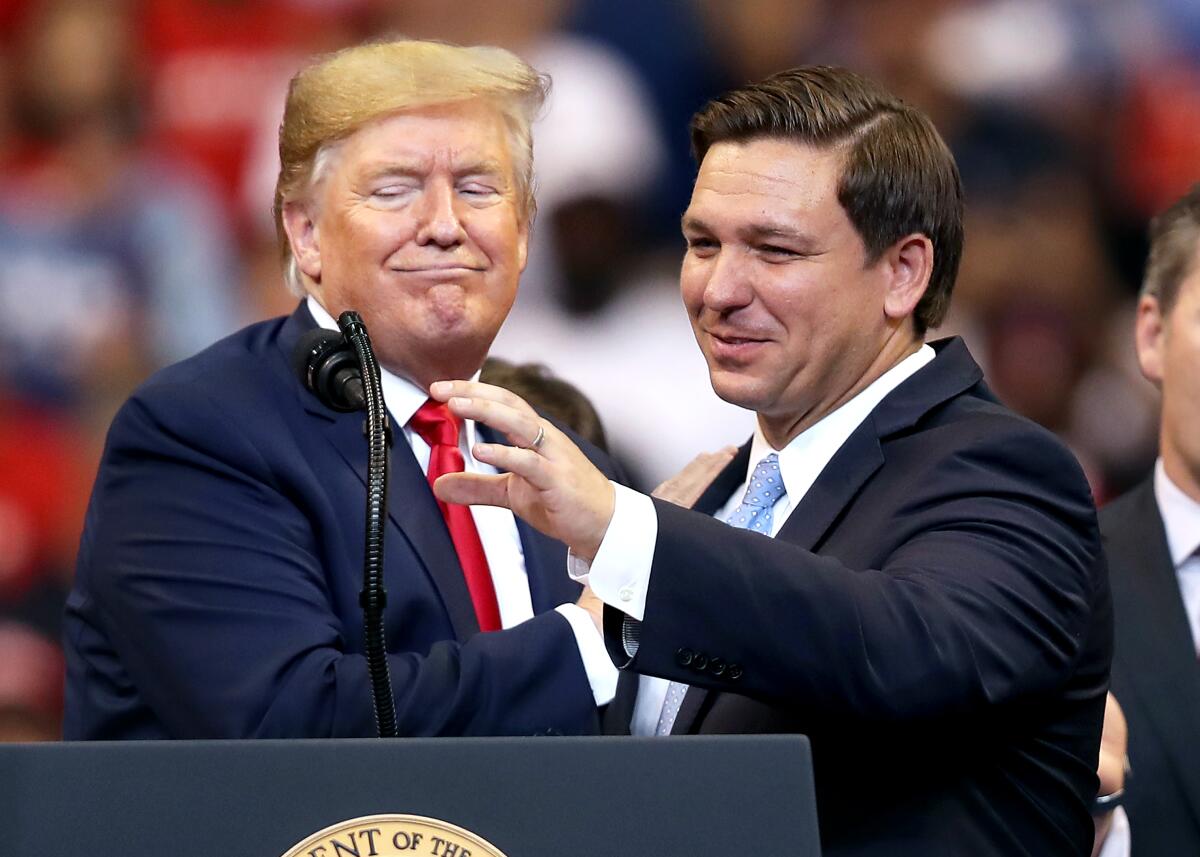Column: Trump’s Big Lie and the Republican Etch A Sketch strategy

- Share via
Some things are so obvious, they scarcely bear mention.
Birds fly. Fish swim. Politicians say things they hope will get them elected.
That’s not as terrible as it might sound.
Candidates could have the most ingenious proposal to, say, banish poverty and end hunger, but what good is that if they can’t win office and at least try to implement their vision?
There is, however, an important qualitative difference between telling voters what they’d like to hear or dialing an issue up or down depending on the audience and knowingly, calculatedly telling a flat-out lie.
Donald Trump lost the 2020 election. That is an incontrovertible fact.
And yet for many Republicans — including most of those seeking the party’s 2024 nomination — Trump’s irrefutable loss and direct responsibility for the Jan. 6 insurrection are a verity they dodge and duck.
At least right now.
Florida’s flailing governor, Ron DeSantis offers a prime example.
The won’t-back-down-culture warrior, who gleefully stoops to swat at teachers and transgender people, meekly tucks his tail when it comes to Trump’s Big Lie and Jan. 6.
DeSantis won’t say if he believes President Biden was duly elected and suggests it’s wrong to call the assault on the Capitol “a plan to somehow overthrow the government of the United States” — though how else would you define a violent attempt to overturn the result of a free and fair election?
Former big-state governors and failed presidential candidates like California’s Pete Wilson and Texas’ Rick Perry are a cautionary tale for the Florida governor.
South Carolina Sen. Tim Scott blames the attempted coup on “the folks who broke into the Capitol” but not Trump — which is like faulting the gunman for a murder and absolving the mob boss who ordered the hit.
Scott and others in the Republican presidential field glancingly acknowledge Biden’s victory (mumble, mumble) then go on to amplify provocative, unfounded claims of voter fraud and other election irregularities, which serves only to legitimize Trump’s bogus claims.
Their motivation isn’t hard to figure out.
Polls have consistently shown most Republicans buying into Trump’s lie about a stolen election, or at least telling pollsters they do. The sentiment is strongest among the likeliest GOP voters; roughly a third of the party base might be described as Bergdorf Goodman Republicans — those willing to back Trump even if he raped a woman in the department store’s dressing room.
The candidate most bluntly calling out Trump’s mendacity — New Jersey’s ex-Gov. Chris Christie — and the one most directly associated with thwarting Trump’s failed attempt to reverse the election — former Vice President Mike Pence — are both running far out of contention for the nomination.
Pence may not even qualify for the stage at next month’s scheduled Republican presidential debate.
Yeesh.
There is, of course, nothing new about a candidate running to the right (or left) to secure their party’s nomination, then scurrying toward the center in the general election. It’s a well-thumbed page from the campaign playbook.
But today’s Republicans aren’t simply running rightward. They’re running “Trumpward,” as GOP strategist Gunner Ramer put it, “scared of alienating the always-Trump bloc within the Republican Party.”
Ramer is political director for the Republican Accountability Project, a group working to deprogram members of the Cult of Trump.
As the 2022 midterms demonstrated, election denialism is a non-starter with most voters outside the MAGA minority. The GOP lost winnable races in Nevada, Arizona, New Hampshire and elsewhere around the country, turning an anticipated red wave into a pink puddle, by fielding numerous candidates who parroted Trump and his incessant lies.
A new study finds that GOP candidates paid a price for perpetuating Trump’s Big Lie about the 2020 election being stolen. Though not huge, the penalty will hopefully serve as a deterrent.
Naturally, if he’s the 2024 nominee, Trump will keep it up. But if someone else emerges to lead the GOP, watch how he or she does an about-face, moving to get on the right side of most voters.
In Nevada, Adam Laxalt was one of the architects of efforts to overturn Biden’s victory and he recklessly fobbed off Trump’s falsehoods throughout the 2022 GOP Senate primary. Then, once nominated, Laxalt allowed as how, yes, Biden had certainly won the White House and was legitimately president.
(Laxalt was among those deservedly defeated.)
In California, 2022 controller candidate Lanhee Chen steadfastly refused throughout the primary season to say whether he’d voted for Trump for president. Then, lo, just a few weeks later Chen revealed to CalMatters that he’d never cast a ballot for Trump and wouldn’t in 2024.
(Chen also lost in the general election, though given California’s Democratic hegemony he doubtless would have been defeated even if he’d tattooed “I ❤️ Joe” to his forehead.)
She refuses to admit defeat in the Arizona governor’s race, making false claims of fraud and conspiracies. A GOP election official’s defamation suit may hold her to account.
In 2012, during the Republican primaries, a strategist for Mitt Romney discussed his boss’ positioning in the race.
Asked if he was concerned that Romney’s rightward movement would complicate efforts to win in November, Eric Fehrnstrom glibly responded, “I think you hit a reset button for the fall campaign. Everything changes. It’s almost like an Etch A Sketch. You can kind of shake it.”
Fehrnstrom’s statement was one of those gaffes in which he’d merely said the quiet part out loud — though his candor certainly didn’t help Romney, who was already dogged by an image of ideological elasticity.
Some Republicans may try to Etch A Sketch away their timidity toward Trump come the fall campaign. But voters should remember which candidates had the guts to speak truth and at what point in the election season.
Spreading Trump’s corrosive lies — or, at the least, enabling his mendacity by failing to call him out— is no typical infraction, like blithely promising a balanced budget or overstating the benefits of reforming the healthcare system. It’s a knife directly in the heart of our democracy.
They say character is doing the right thing when nobody’s looking.
But sometimes it’s doing the right thing when everyone is watching.
More to Read
Get the latest from Mark Z. Barabak
Focusing on politics out West, from the Golden Gate to the U.S. Capitol.
You may occasionally receive promotional content from the Los Angeles Times.














